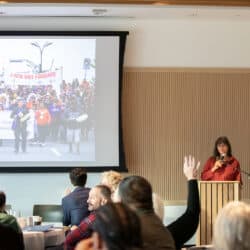Uncommon solutions for the common good
“We are in challenging times for nonprofits… We need the organizational structures that will allow everyone to be more efficient and smarter with the money that is available. Fiscal sponsorship [Charitable Venture Organization] is one of these.”
– Kathleen Enright, Grantmakers for Effective Organizations
Every nonprofit and charitable organization, whether new or old, requires significant financial, legal, and human resources. Maintaining this necessary but costly organizational infrastructure often diverts time and resources away from the mission of an organization’s work. This is especially true for smaller organizations.
This issue of The Philanthropist provides a comprehensive legal and regulatory analysis of an alternative organizational model deployed by Tides Canada. Funded by the Law Foundations of British Columbia and Ontario, lawyers Margaret Mason and David Stevens developed a consultation paper on the model entitled “Tides Canada Initiatives Society: Charitable Venture Organizations—A New Infrastructure Model for Canadian Registered Charities.”
Developed in consultation with legal practitioners and leaders in the charitable sector, the paper explores Tides Canada’s approach to providing a cost-effective, alternative way to implement new programs, bring together groups to collaborate on an issue, and test new approaches to social change through a “Charitable Venture Organization” (CVO) approach.
In essence, Tides Canada provides a home for projects that are in keeping with its mission, providing an organizational alternative to every new initiative, idea, and collaboration needing to establish as a stand-alone entity.
“Tides Canada has allowed our very small staff team to do the work we feel passionately about. Our coalition can thrive in an atmosphere of collaborative leadership without the stress of establishing an infrastructure that might be perceived as competing with or depleting resources from member organizations.”
(Halifax Initiative)
Tides Canada provides comprehensive infrastructure and organizational and governance support for emerging charitable activities, for projects with limited mandates, for community coalitions, and for international charitable organizations seeking a “home in Canada.”
The charitable sector needs to continue to develop new organizational models. The CVO model offers many benefits including:
A home for social innovation – providing the space for experimentation, allowing projects to accomplish discrete goals, and enabling participation in the charitable sector for small, grassroots initiatives that may be kept out of the sector for lack of administrative expertise, capital resources, or familiarity with regulations and requirements.
Improved quality – providing access to experts, ensuring data reliability, promoting transparency, advancing accountability, and ensuring good practices in charitable reporting, accounting and grants management to save projects time on back-office administration, thereby allowing them to focus on their programs and achieve stronger outcomes.
Economies of scale – sharing existing infrastructure for finance, administration, human resources, governance, compliance, and risk management, thereby avoiding investing precious resources in duplicating this infrastructure.
Managed risk – furnishing all participants with comprehensive personnel policies, liability insurance, and forms and training on new government regulations, thereby ensuring the capacity to meet governance and compliance obligations and thus significantly reducing risk.
Shared learning – identifying and encouraging inter-agency collaboration and creating opportunities to increase cohesion among projects, disseminating good practices, providing a professional development track, facilitating peer-to-peer learning among projects, and promoting informed decision making regarding various organizational options for communities as they develop new initiatives and collaboratives.
As significant as the need is to ensure legally sound, accountable organizational structures and comprehensive best practices as outlined in the following paper, we in the charitable sector also need to talk more about what it means to work within shared organizational models.
Beyond the legal structures, policies, and procedures, we need to engage in conversations that explore a number of questions that include:
• How do we continue to create opportunities for new and innovative approaches in the charitable sector, particularly in a climate of reduced funding and increasing needs and pressures in our communities?
• How do we create room for experimentation and risk taking while at the same time ensuring accountability and compliance? And how do we develop the organizational structures and approaches to manage the inherent tensions that go hand in hand with this work?
• What are the leadership skills and competencies (both paid and voluntary) needed to work in new organizational models? And how do we allow these new models and approaches to inform our understanding and approach to leadership, governance, and organizational structures in the charitable sector?
“In addition to building the capacity of fledgling groups and helping them achieve sustainability, fiscal sponsorship (CVOs) promotes more practical thinking among everyone in the nonprofit world about the viability of longer term, shared administrative models.” (How Fiscal Sponsorship Nurtures Nonprofits by Jonathan Spack, Third Sector New England, Fall 2005)
Our hope is that this important paper by Margaret Mason and David Stevens will support the sector’s continued exploration and understanding of new ways of working—and the regulatory environment and best practices to support these new approaches.
Leslie Wright is Principal, Novita Interpares Limited, 1110 Yonge St. Suite 200, Toronto Ontario, m4w 6. Email: leslie@consultnovita.ca .


